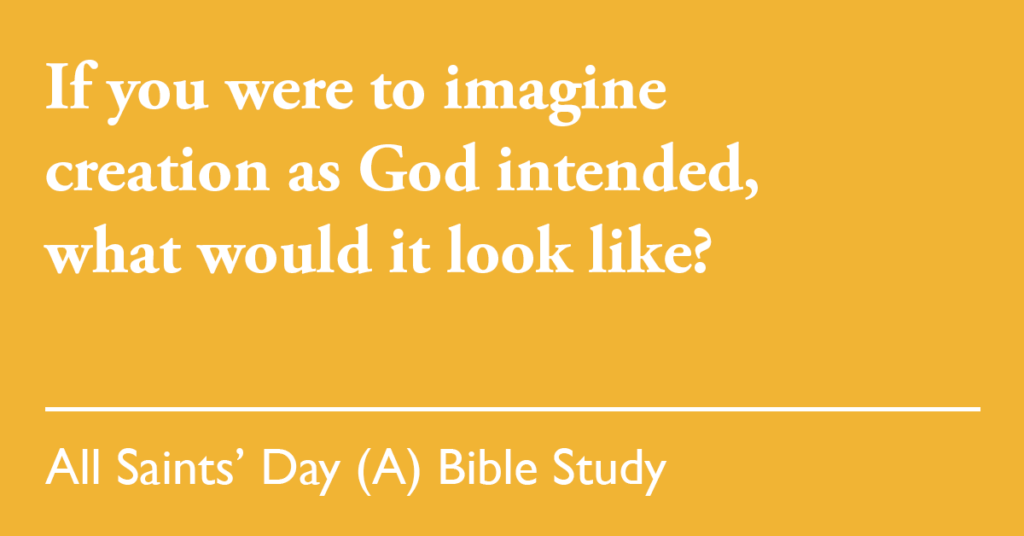Bible Study: All Saints’ Day (A) – 2023
November 05, 2023
RCL: Revelation 7:9-17; Psalm 34:1-10, 22; 1 John 3:1-3; Matthew 5:1-12

Revelation 7:9-17
For all the interpretive challenges Revelation offers, it also provides us some beautiful ways of understanding how God intended creation to be, God’s work to course-correct creation onto the path God intended, and the eschatological fulfillment of God’s intention. Revelation’s placement at the end of the Bible canon compels us to refer to the beginning: Genesis. Our Scriptures begin with God creating everything and proclaiming each thing and the whole of creation good – indeed, very good. Unfortunately, humanity misused the gift of freedom God lovingly gave us. We created division and strife, strayed from that original goodness, and took creation with us. Through the prophets, Incarnation, Crucifixion, Resurrection, Ascension, and coming of the Holy Spirit, God was always working to restore us and all creation to the goodness God originally intended. That’s the context in which we arrive at this passage from Revelation.
Here, we glimpse things as they should be and will be. There is an innumerable multitude as diverse as imaginable (as God created and intended), yet they are all united in their love and adoration of their Creator. They stand in peaceful and loving relationship with one another and to the God who loved them into being and loved them into salvation (again, as God created and intended). They need nothing apart from God – not food, not water, not shade. They are returned to the Garden, where their delight and trust rest wholly in God and their joy is in walking with God.
- If you were to imagine creation as God intended, what would it look like?
- How can that image become manifest even as we await Christ’s coming again?
Psalm 34:1-10, 22
There is a beautiful irony to this psalm. The superscription (which is omitted from the lectionary) ties this psalm to David’s pretending to be insane, an apparent allusion to 1 Samuel 21:10-15. This psalm of thanksgiving and profound faith is attributed to David when he is at a low point. He is on the run. This makes the psalm’s praise that much more powerful. On a feast in which we peek at the eschatological realization of our hope, it is apt that we sing a psalm expressing unshakable assurance that, even on the run, God has heard, delivered, and provided for David (and us). This psalm provides a profound example of hope amid adversity and suffering.
- Where do you find hope when experiencing adversity?
1 John 3:1-3
These few verses of First John are packed with eschatological meaning, looking backward to what God has accomplished to understand what will ultimately become our experienced reality. God loves us so profoundly that God gave God’s very being – God’s Son, Jesus – so that we could live into what we are: Children of God. Yes, we are adopted children, but in the Jewish and Roman contexts of the time, adopted children (really, sons) had all the rights of biological children (again, sons). God takes us so fully into God’s family and being that we become what God created us to be: Bearers of God’s image. This is so, even if it is not always our experienced reality. Knowing that we are children of God produces two results. First, we seek to respond by conducting ourselves as children of God – purifying ourselves, just as God is pure. Second, we have hope. Despite what we might experience as our reality, we know the truth: God’s love extends so far and deeply that we are, ontologically, God’s.
- How do you live out your existence as a child of God?
Matthew 5:1-12
Despite their familiarity, the Beatitudes often pose difficulty for Western ears. Often, the Beatitudes are read as God requiring that we be what follows the “blessed” so that we can reap the benefits of everything that follows the “for.” The idea that we must be poor in spirit, mournful, persecuted, and reviled in order to access the kingdom of heaven runs counter to everything we want for our lives – and, in the extreme, it could cause some to chase persecution to garner a greater reward in heaven.
What if the Beatitudes are intended to run counter to what we consider ordinary, but not quite in the way it might appear? We can hear in the Beatitudes both Jesus’ ministry that follows in the Gospel of Matthew and echoes of the prophets who preceded him. Like the prophets and like Jesus’ ministry, the Beatitudes show us the stark contrast between our priorities and God’s priorities. Where we might work for our own comfort, wealth accumulation, and reputational advancement – perhaps even at the expense of others – God looks first, not to the rich and lofty but to the poor and lowly. God prioritizes the marginalized and oppressed – or, as the prophets urged, the widow and the orphan. God demands justice and liberation on their behalf. And we are called, following the prophets and Jesus’ teachings and example, to do likewise. You could read the Beatitudes as urging us to live into our baptismal vows to “seek and serve Christ in all persons,” “strive for justice and peace among all people,” and “respect the dignity of every human being.”
- How might you realign your priorities with God’s priorities?
¡No olvide suscribirse al podcast Sermons That Work para escuchar este sermón y más en su aplicación de podcasting favorita! Las grabaciones se publican el jueves antes de cada fecha litúrgica.


